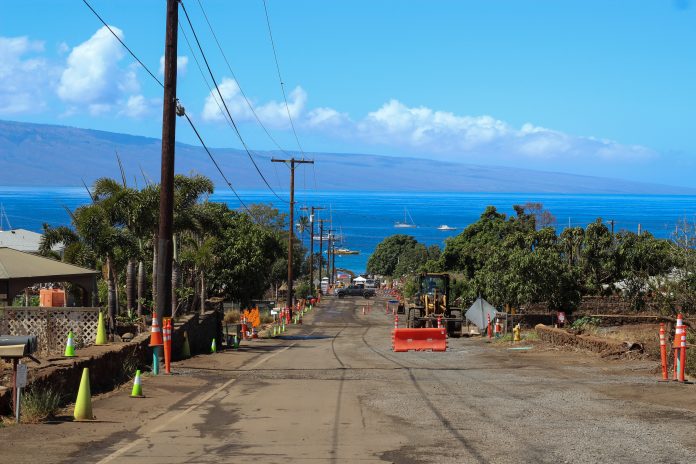By Yiming Fu, Report for America corps member
Krizhna Bayudan’s family lost their home in last August’s Lahaina fire. Their rent assistance from insurance is running out, and she’s not sure what’s next.
Now, Bayudan is in D.C. leading a Maui coalition of disaster-affected communities to demand Community Development Block Grant Disaster Relief funds (CDBG-DR). These funds would be a big deal for Maui renters, who received short-term rental assistance but need continued aid to recover and stay on Maui long-term.
“We’re bracing for another grueling application process with no guarantees,” Bayudan said. “I hope CDBG-DR funds will make this process smoother and provide the critical support families like mine need to rebuild and move forward.”
The issue is also national — Congress has not approved CDBG-DR funds since 2022, meaning disasters in the last two years have not received this longterm relief.
The Hawaii Workers Center coalition landed in Washington D.C. Monday and includes working-class Filipino, Hawaiian and immigrant communities. They are advocating for the Lahaina’s working class. The town is 1/3 immigrants and 80% renters, who are being increasingly pressured by multi-thousand dollar monthly rents and sky-high rebuilding costs with little sense of relief a year and half after the fires.
Nearly half of Maui residents say their financial situation has worsened since the Lahaina fire and about 50% are seriously considering leaving the state, according to a July 2024 Maui Together Wildfire Assessment. Eighty-one-percent of fire survivors know someone who has left.
While FEMA provides immediate, partial assistance, CDBG-DR funds recovery support years later and focuses on funding projects for low-to-moderate income residents.
Bayudan, 24, is the Lahaina Organizer at the Hawaii Workers Center. She recently graduated the University of Hawaii at Manoa and is back home advocating for the community that raised her. Her dad is a carpenter from the Philippines who built his dream home and many others across Lahaina.
She said the Maui coalition will be setting up meetings with Congress members this week and knocking on their doors to approve the funding proposal.
The money would be a huge help to Maui — contributing home repairs, multi-family housing, sewer and road rebuilds, workforce training and small business loans. They also provide local and state governments more spending flexibility.
Veronica Jachowski, is the executive director for Roots Reborn, a nonprofit organization that advocates for immigrants’ rights and fire survivors in Lahaina. Roots Reborn is part of the coalition in D.C. this week.
She said this long-term funding is especially important for renters, who need continual aid. While survivors may receive one-time rental assistance or one-time food assistance, long-term funds are key to expanding the definition of recovery as more ongoing, recurring and all-encompassing
“If we want to prioritize surviving — and not just barely surviving but actually being able to rebuild and recover — we need to implement something that’s more inclusive,” Jachowski said.
Sieny Corpuz is going to D.C. for a week on behalf of Kaibigan ng Lahaina, an organization for Lahaina’s Filipino community. She wants to share Maui’s stories with Congress to highlight the workforce community, who she calls the “backbone” of Lahaina and have lost their jobs and homes. The recovery is far from over.
“We’re going to go to DC to advocate and to make sure the nation knows we still need help,” Corpuz said, “and we’re still trying to recover.”
Beyond Maui, the funds will also help other disaster-affected communities across the country. The Maui coalition is working alongside other disaster-affected communities in North Carolina, Florida, Texas, Louisiana and Georgia.
FEMA Administrator Deanne Criswell said 2024 had 172 disaster declarations, compared to 113 last year, NPR reports.
“We saw the second-busiest spring tornado season ever recorded,” Criswell said. “And we’ve seen, overall, a 50% increase in disaster activity.”
Nadezna Ortega is the executive director of Tagnawa for Maui, which supports Lahaina’s Filipino immigrants recovering from the fire. She said it’s important to listen to Lahaina’s working-class people, its women, families and communities of color. This advocacy could lead to important changes nationwide.
“Release the funds that will make a just recovery possible– not just for Lahaina, but for all disaster-impacted areas across the country,” Ortega said.
AsAmNews is published by the non-profit, Asian American Media Inc.
We are supported through donations and such charitable organizations as the Robert Wood Johnson Foundation. A huge thank you to all our readers who supported our year-end giving campaign. Not only did you help us reach our goal, you busted through it. Donations to Asian American Media Inc and AsAmNews are always tax-deductible. It’s never too late to give.
Please also follow us on Instagram, TikTok, Facebook, YouTube and X.

